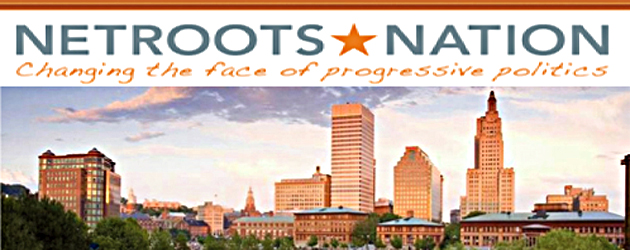By: Chuck Colbert/TRT Reporter–
For the hundred-plus LGBT bloggers, activists, journalists, and community leaders who attended the Netroots Nation conference in Providence, Rhode Island, last weekend, two key buzzwords – networking and interesectionality – were also take-away messages from the annual gathering of the political left.
“The highlight of the pre-convention was to me found” in connecting “names and faces with people we only knew from the web,” said San Diego-based Autumn Sandeen, a transgender activist and blogger for Pam’s House Blend. Meeting folks in person, she added, created an opportunity for “collaboration.”
Sandeen was referring to LGBT Netroots Connect, a one-day programming component of Netroots Nation, the political convention for American liberal to progressive activists.
This year Netroots Nation drew 3,000 people, including Representative Tammy Baldwin (D-Wisconsin), who is hoping to become the first out lesbian to be elected to the U.S. Senate.
LGBT Netroots Connect was held on Wednesday, June 6, a day before the larger Netroots Nation gathering, June 7-10.
“Netroots Nation has always had a gay presence,” said Mike Rogers, managing director of Raw Story and a Washington, D.C.-based activist. “But by having a pre-convention, we are able to create small-group connecting within the work that we do.”
Rogers is director of LGBT Netroots Connect.
The day’s programming included a discussion of best practices for online individuals and organization, including tips on how to drive website traffic, attract blog advertising, optimize search engine capacity, and conducting opposition research.
Same-sex marriage remains a predominant issue for the LGBT community. Accordingly, one marriage-related panel discussion focused on ballot-box versus legal strategies, federal versus state approaches to achieving marriage equality, coalition-building with communities of color, the whys of marriage referenda losses, and the role of religious opposition to gay marriage.
And yet same-sex marriage was among other conversations of importance, including one panel on immigration policy as it pertains to bi-national couples and support for undocumented LGBT folks.
In another panel discussion, pre-convention participants also tackled the topic of LGBT health and HIV/AIDS.
In yet another conversation, attendees shared strategies on advancing fuller LGBT equality in red and purple states, those primarily in the South, Midwest, and Rocky Mountain West.
Over the last few years, the gathering of LGBTs has “taken on different operational forms,” said Rogers, referring to initial efforts at breaking down barriers among online folks. Networking expanded, he explained, by adding journalists and individuals from LGBT organizations to the mix.
“This year we had more conversations about our personal experiences and how they affect the issues and work we do and how folks can a get skill sets to explain those stories,” said Rogers.
In addition to LGBT Connect, Netroots Nation’s general program featured two LGBT-specific panel sessions, one on the topic of marriage equality: past present, and future, and the other, blogging for transgender equality: history, challenges, and progress.
Netroots Nation also held a marriage equality caucus and an LGBT caucus.
The same-sex marriage discussion featured leaders from all four states with referenda on the ballot this fall – Maine, Maryland, Minnesota, and Washington state.
One of this year’s great successes, said Rogers, was the inclusion of an LGBT caucus where issues beyond marriage came under consideration.
“One of the things I am most proud of is the extent to which Netroots Nation went to make transgender inclusion” a reality, said Rogers.
The transgender panel in fact provided a good example of intersectionality.
“Intersectionality isn’t just a talking point,” said panelist Sandeen.
“It’s a means to achieve positive ends for multiple communities by increasing the numbers of people working on issues we care about.”
As she explained, “We talked in our session a great deal about how we trans activists are intersectional in the way we do activism, and that basic, intersectionality theme that was repeated throughout the conference.
“I met trans activists Jos Truitt, who has a long history working on reproductive rights issues, and Monica Roberts, who works to build bridges between the LGBT and black communities,” said Sandeen.
“Seeing the work these trans activists do, and seeing up close how strong and powerful these folk really are, plus just getting to know them as people – that alone for me made the entire trip an incredible experience,” she explained.
Also on the panel was Jennifer Levi, Transgender Rights Project director at Boston-based Gay & Lesbian Advocates and Defenders (GLAD). Jillian Weiss, Ph.D., a contributor to the Bilerico Project blog, moderated the discussion.
Weiss voiced gratitude to Rogers for enabling so many people to meet face-to-face. “His vision has created a space where people who communicate all year long by means of blogs, Facebook, and Twitter can come meet face-to-face to talk about the major issues for year ahead. This conference is invaluable because it moves on-line advocacy to off-line communication and action,” she said.
In fact, Rogers raised thousands of dollars to provide full scholarships to more than 30 attendees and to make sure the day’s program was cost free for individuals and online activists. Under GLAD’s sponsorship, the transgender panel was first for Netroots Nation.
Diversity was a hallmark of this year Netroots LGBT Connect, said Rogers, with record numbers of women, people of color and transgender persons in attendance.
Under GLAD’s sponsorship, the transgender panel was a first for Netroots Nation.
“I think it’s important for LGBT bloggers and advocates to attend Netroots Nation so we connect our work with a broader progressive movement,” said GLAD’s Carisa Cunningham, Public Affairs and Education director. “I love seeing face-to-face bloggers who write about our work, and brainstorming about the best ways to get our issues out there – in our own community and beyond.”
Another Netroots Nation participant was Washington, D.C.-based Peter Montgomery, who attended the convention with a team of bloggers, online activists, and policy experts from People For the American Way, where he is a senior fellow and a contributor to PFAW’s Right Wing Watch blog.
“I was also hoping to get ideas for stories for Religion Dispatches, where I am an associate editor,” he said.
The theme of intersectionality was also a “highlight,” said Montgomery, “affirming for me that the LGBT movement cannot thrive apart from a broader progressive vision that means working partnerships with advocates for civil and voting rights, workers’ right to organize, a just immigration policy, and an economy that builds up rather than destroys the opportunity for shared prosperity.”
“So many people live in many intersections at once,” said Montgomery. “I was inspired by a lesbian Filipina doing work to support immigrants’ rights in rural Tennessee and by a straight woman Episcopal priest who has challenged many in her Afro-Caribbean congregation with her commitment to marriage equality as part of a broad commitment to justice for all people.”
For Montgomery, “One concrete highlight was the speech by Ben Jealous of the National Association for the Advancement of Colored People, which has made history by embracing marriage equality,” he explained.
“Another was attending a panel on the importance of arts and cultural activism, and hearing a young, gay, undocumented artist talk about his life, work, and activism – and his making the explicit connection between publicly ‘coming out’ as an undocumented immigrant and the LGBT sense of coming out – parents urging you to be careful and keep it quiet, making a decision to come out of the shadows, the relief at living openly in spite of the risks,” said Montgomery.
Next year Netroots Nation travels to San Jose, Calif., from June 20-23.
© Copyright. Chuck Colbert. All rights reserved.








